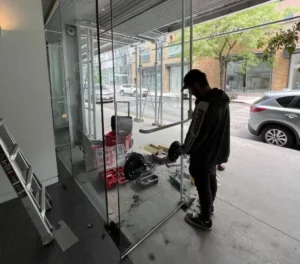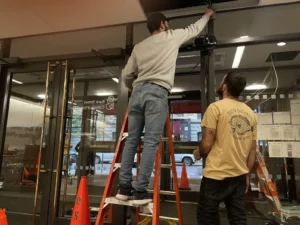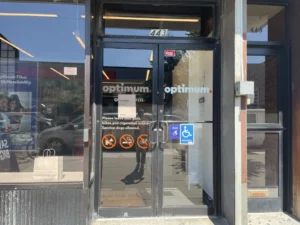
Importance of ADA-Compliant Locks in Commercial Buildings

When it comes to constructing and maintaining commercial buildings, numerous codes and regulations must be followed. One crucial regulation many people may need to be aware of is the requirement for commercial buildings to have ADA-compliant locks.
The Americans with Disabilities Act (ADA) was passed in 1990 to ensure that people with disabilities have equal access to public places and accommodations. One key area of the ADA is accessibility requirements for buildings, and ADA doors are designed to address this issue.
What Is an ADA Door?
ADA doors are designed to provide ease of access for people with disabilities. These doors are typically wider than standard, with a minimum width of 32 inches, so wheelchairs and other mobility devices can easily pass through them.
In addition, they are equipped with levers or handles that are easy to grip and use, providing independence and convenience to those with limited mobility. These handles are typically located 34 to 48 inches off the ground, depending on the type of door and the user’s needs.
What Are ADA-compliant Locks?
ADA-compliant locks are designed to be accessible to people with disabilities. These locks must meet specific standards set forth by the ADA, which include the following:
- Ease of operation: ADA-compliant locks must be easy to operate with one hand and minimal effort. This means the safety cannot require tight grasping, pinching, or twisting of the wrist.
- Height: The lock must be installed at a size that is easy for people with disabilities to reach. This typically means the safety must be lodged at least 48 inches above the floor.
- Visual contrast: The lock must have a visible difference from the security door or frame so that it is easy to see and identify.
- Lever design: The lever design must be easy to grasp and operate. It cannot require tight grasping, pinching, or twisting of the wrist.
Why Are ADA-Compliant Locks Required?
The ADA requires commercial buildings to have ADA-compliant locks to ensure that people with disabilities have equal access to public accommodations. Without these locks, people with disabilities may have difficulty accessing certain areas of a building, which can violate their rights under the ADA.
In addition to the legal requirements, there are also practical reasons for having ADA-compliant locks. For example, suppose a building does not have these locks. In that case, it may be difficult for people with disabilities to enter or exit the building, which can be a safety hazard in an emergency.
What Types of Locks Are ADA-Compliant?
Several types of locks are ADA-compliant, including:
- Lever locks: Lever locks are one of the most common ADA-compliant locks. They are easy to operate with one hand and do not require tight grasping or twisting of the wrist.
- Push-button locks: Push-button locks are another type of ADA-compliant lock. They are easy to operate with minimal effort and do not require tight grasping or twisting of the wrist.
- Electronic locks: Electronic or automatic doors can also be ADA-compliant if they meet specific standards. For example, they must be easy to operate with one hand and have a visual indicator to show when the lock is engaged.
It is important to note that not all locks are ADA-compliant. For example, traditional vital locks may not be ADA-compliant if they require tight grasping or twisting of the wrist.
How Can Building Owners Ensure Compliance?
Building owners can ensure compliance with ADA lock requirements by working with a locksmith or security professional who is familiar with the requirements. These professionals can help identify which locks are ADA-compliant and install them according to existing standards.
In addition to working with a professional, building owners should also be aware of the ADA requirements themselves. The ADA provides detailed guidelines for accessibility requirements for buildings, including requirements for locks. Building owners should familiarize themselves with these guidelines and ensure their facilities comply.
Matador Security Services: Your Partner in ADA-Compliant Security Solutions
Commercial buildings must have ADA-compliant locks to ensure that people with disabilities have equal access to public accommodations. Building owners can ensure compliance with ADA lock requirements by working with a locksmith or security professional. By following these requirements, building owners can help ensure that their facilities are accessible to everyone, regardless of their abilities.
Matador Security Services is a premier door installation and maintenance company in New York City. Our knowledge of the subject needs to be improved, and we provide residential and commercial clients with a wide range of services. Matadoor Security Services is the firm to contact if you need an ADA door installed or your current one repaired. Get in touch to experience our outstanding services for manual and automatic doors!



